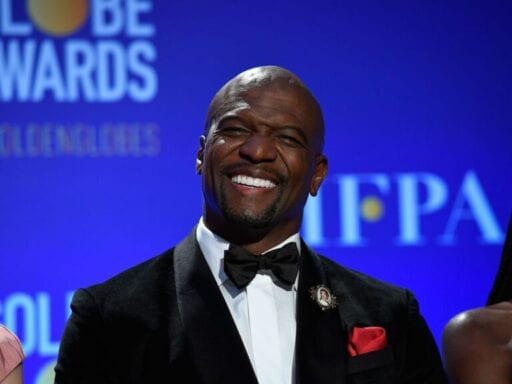It’s just the latest example of Crews’ efforts to challenge toxic masculinity.
At a time when so many topical issues in the news seem to take root in toxic masculinity, actor Terry Crews has made a name for himself in challenging that culture — even if it means going after his own peers for falling into traps of victim-blaming and mocking allegations of assault.
On Sunday, he set his sights on actor and comedian DL Hughley, who had suggested in an old interview that Crews has himself to blame for being groped.
Back in August, Hughley told VLAD TV in an online interview that he didn’t believe it was possible that Crews could be assaulted because he was so strong and physically fit, he could easily fight back.
“Hey motherfucker, God gave you muscles so that you can say no, and mean it,” Hughley says with a laugh.
Whether Crews just found the interview or had been holding back for months out of respect for someone he says he’s supported throughout his career, he decided over the weekend to call Hughley out on Twitter.
You told the world “God Gave Me Muscles So I Could Say No…”
Are you implying I “wanted” to be sexually assaulted?
I’m listening, sir…https://t.co/v6Q4xrvfJQ
— terry crews (@terrycrews) January 27, 2019
Crews, who currently stars Brooklyn Nine-Nine, was among the first celebrities to come forward in the #MeToo era after he accused Adam Venit, a powerful Hollywood agent at WME, of groping him at an industry event in 2016. Crews filed a lawsuit against Venit within months of going public, and he later dropped WME as his agency. Then last March, prosecutors ultimately decided to not charge Venit for the alleged assault.
Hughley in the interview appears to cast broad judgment on the #MeToo movement as a whole (“Everybody is so into this notion that ‘it happened to me too,’” he says). And when pressed to see the alleged assault from Crews’ perspective, Hughley says he would never have let it happen.
Responding on Twitter, Crews asked whether Hughley was implying in the interview that he “wanted” to be touched inappropriately or that he is to blame for his own assault.
“Sir you said I should have pushed him back, or restrained him and I DID ALL THOSE THINGS… but you act like I didn’t,” he tweeted.
Still, Hughley says Crews could have done more.
“That’s different than slapping the shit outa him,” Hughley tweeted back.
Hughley is not the first high-profile celebrity to either mock Crews or question his story — nor the first one Crews publicly called out on it. He’s gone after rapper 50 Cent, who posted a crude meme on Instagram of a topless image of Crews with the text: “I got raped, my wife just watched.” He also shamed Russell Simmons, who himself has been accused of assaulting multiple women, for telling Crews to give his aggressor a pass. And just days ago, Crews and activist Tariq Rasheed got into a heated Twitter battle over toxic masculinity and what it means to be an ally to black women and victims of assault.
I don’t know why actor Terry Crews is so mad at me.
He sure didn’t have that same energy when he let that white man grab his crotch pic.twitter.com/2uandGTVwG
— Tariq Nasheed (@tariqnasheed) January 24, 2019
It’s no coincidence that Crews is confronting other black, male celebrities, many of whom (though not all), make light of his assault by objectifying his body. A former NFL player, Crews often plays characters that are largely defined by his muscled physique. But the fixation on his body — and the racially loaded assumptions that an extremely fit black man couldn’t possibly be assaulted — is exactly what Crews is seeking to challenge.
Crews has long-challenged toxic masculinity. It’s especially prescient today.
In recent years, Crews has emerged as an enforcer of sorts for cultural accountability in how we talk about sexual violence and assault, shining a harsh light on the social pressures that silence victims and allows allegations to go unreported. His voice has been crucial in pointing out that men, of course, can be victims of sexual aggression. But his activism on this front is not purely a product of #MeToo.
For years Crews has tried to challenge the roots of toxic masculinity, in part by taking a hard look at his own weaknesses and issues with manhood. He wrote a book challenging perceptions around what defines ‘manliness,’ he’s testified before Congress to advocate better protections for assault survivors, and for years, he’s publicly identified as a feminist.
Crews’ message is all the more prescient when you look at the backlash to even talking about toxic masculinity or treating it as a real issue. We saw it in the reaction to the (well-intentioned, though poorly executed) Gillette ad, which had men losing their cool over what they saw as “gender shaming” once-loyal customers. And again the issue cropped up in last week’s controversy between the Covington Catholic students and Native American elders, where early defenders for the kids felt that boys will be boys, and they did nothing wrong.
We’re often terrible at talking about toxic masculinity in a meaningful way that’s able to shift behaviors without spurring defensive backlash. But in light of extreme cases of violence and hatred toward women — it’s clear this is a conversation we need to be having. And Crews, at least, intends to have it.
Author: Amanda Sakuma
Read More



